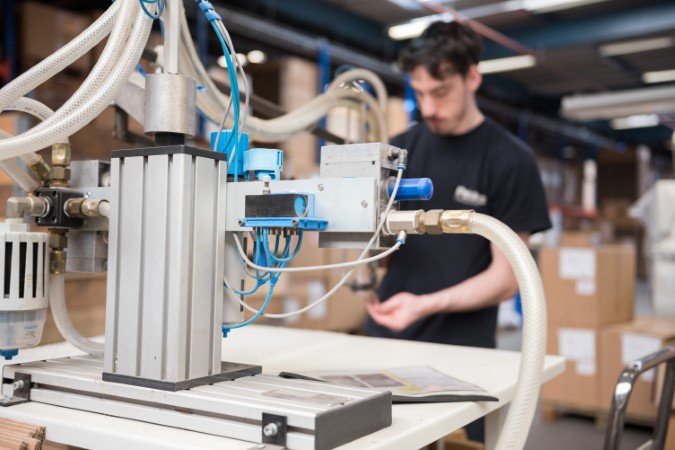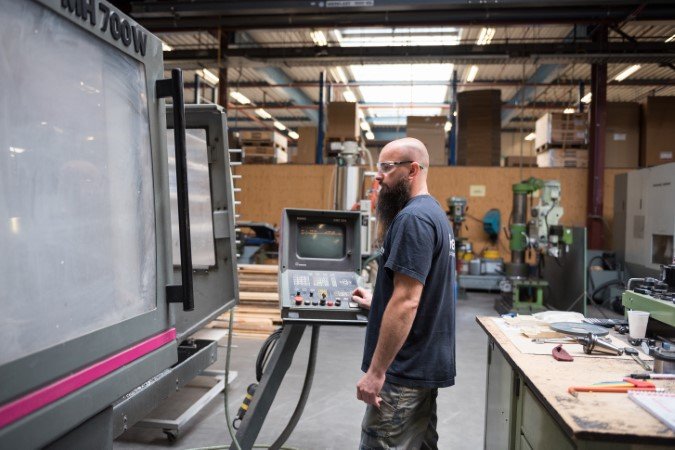Foam moulding: Pekago’s expertise
Thanks to the decades of experience we have accrued since the company was founded in 1983, Pekago Covering Technology now is an injection moulding company that has a high level of expertise in thermoplastic foam casting and foam moulding. We both develop our own moulds and we advise our clients on the manufacturability of their plastic products. Not only is our expertise deep – it is also wide: the markets that we operate on include, but are not limited to, medical equipment, aircraft interiors, analysis equipment and imaging systems. Pekago realises the best solutions to protect, embellish and improve its clients’ products (covering, protecting and improving your technology).
Foam moulding: what is it?
Foam moulding is a process derived from injection molding that either adds a gas to the polymer to reduce its density or introduces blowing agents to achieve the same result. When the gas or blowing agent is added, the plastic foams, which gives this product its name. The result is a lighter product that requires fewer post-production processes and less assembly. We distinguish two main types of foam molding. The first type is known as the low-pressure process. During this process, a gas is added to the melted plastic before it enters the mould. Once the plastic is injected into the mould the gas causes it to foam. The second type of foam molding uses ordinary injection molding machines but includes a blowing agent in the material mix. These blowing agents are dry chemicals that are added to the plastic granules before they enter the machine. When the plastic is melted by the machine’s heating elements the heat causes the blowing agent to react, turning into a gas and foaming the plastic. The texture of the plastic these processes produce is often described as a sponge or honeycomb because of the small pockets of air that are created. The honeycomb centre is surrounded by a dense outer layer to ensure stability.
What can foam moulding be used for?
Foam molding is a commonly used process that can create many useful products. The low-pressure version of structural foam molding is a more controlled process than standard injection molding. This allows larger pieces to be produced. In addition, structural foam products have a high stiffness ratio that can be beneficial in many settings. What’s more, since structural foam products are coated with a strong outer skin, they remain sturdy, as well as flexible and lightweight. Some common uses of structural foam are in the making of machine housings for businesses, components for point-of-sale displays, container pallets, and machine chassis components.
Common materials for foam moulding
Many different types of plastic can be used in the foam molding process. Here we provide a brief overview of some of the most common types with their unique benefits:
- Acrylonitrile-Butadiene-Styrene (ABS): ideal for use in housing components where dimensional stability and colour are important.
- Polystyrene (PS): sufficiently dimensionally stable, strong, hard, easy to lacquer and mechanically process and relatively cheap. A flame-retardant version is also available.
- Polycarbonate (PC): is inherently flame-retardant, has an excellent transparency and has very good mechanical properties.
- Polypropylene (PP): this material has an unprecedented chemical stability, is easy to colour, and easy to injection mould.
Foam moulding at Pekago: we are happy to answer your questions
As experts at carrying out precise and high-quality production processes for foam moulding, we are confident that we can get you the product you need. We pride ourselves on having a highly-skilled and dedicated team of engineers and machine operators who are able to accommodate your needs. We therefore happily invite to get in touch with us to discuss your foam moulding needs and the requirements of your project(s). You can send us an e-mail at sales@pekago.nl or reach us via the telephone at +31 13 530 80 77. Through this link, you can also fill out our contact form or find more information about how to get in touch with our representatives for Germany, Austria and Switzerland.




